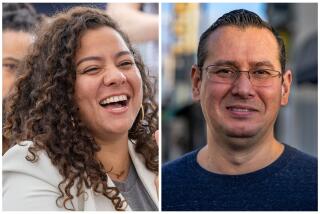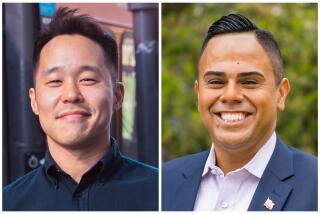ELECTORAL LOGJAM : On Westside, Many Politicians Feel Call but Few Are Chosen
- Share via
Steve Saltzman, an ardent political activist and one-time model who was last seen on billboards promoting a line of brandy, holds his first big fund-raiser tonight in his bid to succeed Los Angeles City Councilman Zev Yaroslavsky.
Saltzman expects to pick up about $50,000 for his fledgling campaign. The money will help pay for his headquarters and a small staff as Saltzman strives to establish credibility in a council district that extends from the modern arteries of Westwood Village to the Old-World alleys of the Fairfax District.
Never mind that the election is two years away and that Yaroslavsky has yet to formally declare that he is vacating the seat to run for mayor. When political opportunity knocks on the Westside, nobody wastes any time getting to the door.
‘Never Too Early’
“It’s never too early to start,” said Saltzman, 38. “As soon as it appeared that the 5th District seat was opening up, I was prepared to go.”
Early campaign starts are fast becoming institutionalized on the Westside, where the number of politicians in waiting far exceeds the number of openings. Activists like Saltzman often spend years positioning themselves for a job. Others may wait even longer for a chance to advance.
Some caught in the political bottleneck tend to become frustrated, even angry. For many it’s as if the political machinery had rusted or ground to a halt. Santa Monica City Councilman Alan Katz, who openly aspires to higher office, said that the obstacles faced by candidates can be insurmountable.
“If you think the freeways are crowded look at the political pathways,” Katz said. “There are people who are chomping at the bit to move up.”
Political bottlenecks may exist elsewhere, but Westside activists say that the problem is especially troublesome in their own backyard. The wealthy, liberal and largely Jewish area that runs from Hollywood to Malibu, taking in Beverly Hills, Bel Air, West Hollywood and Santa Monica, has a tradition of electing ambitious and able officials who rarely are pushed out of office. Political openings mostly occur when someone retires or seeks a higher post.
Clubbish Atmosphere
Elections are also expensive, costing anywhere from hundreds of thousands to millions of dollars. And political opportunities tend to be limited for people who are not affiliated with a sophisticated political organization. One official, who asked not to be named, described the political atmosphere as clubbish: You are either in or your are out.
“There are not that many opening rungs on the political ladder,” said Rep. Mel Levine (D-Santa Monica), a possible Senate candidate in 1992. “And when there are a few, they are immediately filled with talented politicians.”
“The system is bottled up, but it is bottled up by some very capable people,” said Beverly Hills Mayor Benjamin Stansbury Jr., another career-minded politician. “We are such an activist population here that we tend to have a lot of competent people, and there aren’t enough seats to go around.”
The most highly prized Westside posts include the Los Angeles City Council seats held by Marvin Braude, Michael Woo, Ruth Galanter and Yaroslavsky, and the county supervisor positions belonging to Deane Dana and Edmund D. Edelman.
Gwen Moore (D-Los Angeles), Tom Hayden (D-Santa Monica), Burt Margolin (D-Los Angeles) and Terry B. Friedman (D-Tarzana) hold the Assembly seats and David A. Roberti (D-Los Angeles), Herschel Rosenthal (D-Los Angeles), Diane Watson (D-Los Angeles) and Gary K. Hart (D-Santa Barbara) are in the state Senate.
Rounding out the list is the Westside’s congressional delegation: Reps. Henry A. Waxman (D-Los Angeles), Howard L. Berman (D-Panorama City), Anthony C. Beilenson (D-Los Angeles), Julian C. Dixon (D-Los Angeles) and Levine.
Limited Chances
Yaroslavsky is the only member of the group who is talking about vacating his seat in the near future. (The mayoral race is in 1989). After that, there may not be another significant opening until 1992. And by then there could be fewer elective positions on the Westside because of mandatory reapportionment.
“There are only so many seats,” said Rosenthal, at 69 the oldest member of the group. “I would just tell people that they have to be patient.”
One person who has been surprisingly sedentary is Hayden. When he was first elected to the Assembly in 1982, the political oddsmakers said that the former anti-war activist and husband of actress Jane Fonda was only keeping the seat warm until something better opened up.
Hayden has disappointed them. Next year he is expected to seek his fourth term. Attaining seniority in a position you already hold can be just as satisfying as moving up, the assemblyman said.
“I like what I am doing,” Hayden said. “On a political level, I can get more done for people in this job than in any other job I can imagine.”
Limited Potential
Hayden might reevaluate his position if Rosenthal retired from the Senate or if Levine ran for higher office. But the assemblyman said that the potential for political advancement is limited.
“As a young man I believed that dream about the opportunities on the coasts (that drew) a lot of people of my generation to New York or Los Angeles,” he said. “It’s too bad that many of us didn’t stay in our own states. . . . You get an overabundance of talented, politically ambitious people in New York and L. A. who have left other parts of the country.”
If Hayden abandoned his seat, three probable candidates for the post would be Santa Monica City Council members Alan Katz, Christine E. Reed and Dennis Zane. Katz has ties to the Westside’s powerful Berman-Waxman political organization and is working as Lt. Gov. Leo McCarthy’s chief of staff. Reed, a liberal Republican, is the dean of the Santa Monica council. Zane is a leader of Santa Monica’s powerful rent control movement and a board member of Hayden’s statewide political organization, Campaign California .
Zane said his ambition is tempered by his respect for the present officeholders on the Westside.
“I guess I have mused about the future from time to time,” Zane said. “But frankly the current officeholders seem rather stable. They are candidates that I support. . . . I am not craving the idea of running for another office. But one reason is that there’s nowhere to go.”
Money Problem
As a Republican, Reed is not bound by allegiance to Democratic officeholders. Her problem is money.
“You have to look at what you are up against,” Reed said. “There is no point in running against Tom (Hayden) unless you are married to someone with resources equivalent to Jane (Fonda).”
A Westside native named Richard Katz once was viewed as bright political prospect. He was active in political circles and was friendly with some top Democratic officials. But it was not until he left the Westside for the San Fernando Valley that Katz realized his political ambitions.
Assemblyman Katz (D-Sepulveda) said his prospects were better in the Valley.
“There is a tremendous amount of talent from the West L. A.,” said Katz, who was elected in 1980, three years after leaving the Westside. “There are more nonpartisan issues in the Valley and a lot more opportunities.”
All in the Game
Assemblyman Margolin said frustration among would-be candidates is a part of politics. It has been his experience that openings run in uneven cycles. The last one occurred in 1982, when three Assembly seats, two state Senate posts and one seat in the Congress came up for grabs on the Westside.
He advised potential candidates always to be ready to get into a race.
“For people to resign themselves to three or four years with no turnover is unduly pessimistic,” Margolin said. “Opportunities come along. People decide to run for higher office or return to the private sector.”
Such an opportunity occurred last year when Gray Davis unexpectedly gave up his 43rd District Assembly seat to run for state controller. Several people set their sights on the seat, which includes Beverly Hills. But talk of a highly competitive campaign began to fade when the Berman-Waxman organization anointed Friedman as Davis’s successor.
Another political opportunity occurred earlier this year but was discounted by most Westside politicos.
Slow Recognition
When Pat Russell came up for reelection in April, the conventional wisdom was that the veteran Los Angeles City Councilwoman was a shoo-in to retain her seat. And as the filing date passed, five underfinanced and little-known community activists were the only challengers in her path.
What most mainstream politicians failed to recognize was the degree of outrage over development in Russell’s district. Ruth Galanter, a slow-growth activist, emerged from the pack to trounce Russell in a June 3 runoff.
“Sure, Galanter got in,” said one Westside activist who asked not to be named. “But that didn’t relieve the political pressure because she was an outsider. No one expected her to win. The whole thing was a fluke.”
There is no reason to anticipate a similar scenario in the 5th Council District. If Yaroslavsky runs for mayor in 1989, observers say that there could be as many as 12 candidates in the race for his council seat.
Saltzman is the only confirmed contender so far. Two others mentioned as potential candidates are Laura M. Lake, a leader of two slow-growth organizations called Friends of Westwood and Not Yet New York, and Lisa Specht, a lawyer and liberal political activist with close ties to the Berman-Waxman organization who ran an unsuccessful campaign for Los Angeles city attorney in 1985.
Saltzman hopes that the early bird gets the term.
“I can’t even file formally until January of 1989,” Saltzman said. “But if I want to be in a position to win this election getting an early start is an absolute practical matter. The window of opportunity will begin to rapidly shut next year.”
More to Read
Sign up for Essential California
The most important California stories and recommendations in your inbox every morning.
You may occasionally receive promotional content from the Los Angeles Times.










